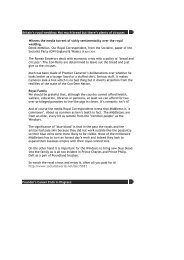New meanings of Panafricanism in the era of globalisation
New meanings of Panafricanism in the era of globalisation
New meanings of Panafricanism in the era of globalisation
Create successful ePaper yourself
Turn your PDF publications into a flip-book with our unique Google optimized e-Paper software.
economy and <strong>the</strong> consequent imp<strong>era</strong>tive for Africans to f<strong>in</strong>d “African solutions”? To put<br />
<strong>the</strong> issue beyond all doubt: <strong>the</strong> fact that <strong>the</strong> ANC leadership, toge<strong>the</strong>r with <strong>the</strong>ir allies <strong>in</strong><br />
Algeria, Nigeria, Senegal and elsewhere have adopted <strong>the</strong> neolib<strong>era</strong>l economic orthodoxy<br />
<strong>of</strong> <strong>the</strong> Wash<strong>in</strong>gton consensus as <strong>the</strong> frame <strong>of</strong> reference for <strong>the</strong> promotion and<br />
implementation <strong>of</strong> NEPAD means noth<strong>in</strong>g less than that it will benefit only <strong>the</strong> elites if it<br />
works at all. The vast majority <strong>of</strong> <strong>the</strong> urban and <strong>the</strong> rural poor will rema<strong>in</strong> on <strong>the</strong> marg<strong>in</strong>s,<br />
desp<strong>era</strong>tely try<strong>in</strong>g to eke out an existence <strong>in</strong> an alien and hostile world. Most <strong>of</strong> <strong>the</strong> more<br />
<strong>in</strong>sightful scholars <strong>of</strong> African affairs are extremely pessimistic and sceptical <strong>in</strong> this<br />
regard. Thus, Saul and Leys (1999) conclude that “… <strong>the</strong> dream <strong>of</strong> a transformative<br />
capitalism <strong>in</strong> Africa rema<strong>in</strong>s just that: a dream”.<br />
NEPAD, seen from <strong>the</strong> perspective <strong>of</strong> a South African, is simply GEAR writ large. Like<br />
<strong>the</strong> domestic version <strong>of</strong> <strong>the</strong> strategy, it is driven by <strong>the</strong> need to attract foreign direct<br />
<strong>in</strong>vestment and to stimulate growth by means <strong>of</strong> an export-led strategy <strong>in</strong> <strong>the</strong> hope that a<br />
trickle-down effect will be forthcom<strong>in</strong>g sooner ra<strong>the</strong>r than later. The failure <strong>of</strong> this policy<br />
<strong>in</strong> South Africa itself, after more than seven years <strong>of</strong> implementation, is common cause.<br />
Only those who, as Marais (2002:87) formulates it, are will<strong>in</strong>g to employ “obtuse<br />
measurements” would hope to be able to conceal its “failure to achieve its major stated<br />
goals – growth, jobs, and redistribution….”. In case <strong>the</strong>re should be any doubt about <strong>the</strong><br />
bourgeois orientation <strong>of</strong> <strong>the</strong> rul<strong>in</strong>g party, I should po<strong>in</strong>t to <strong>the</strong> persuasive argument<br />
brought forward by Marais (2002) that <strong>the</strong> shift (from <strong>the</strong> more populist Reconstruction<br />
and Development Programme) to GEAR was a carefully planned, delib<strong>era</strong>te process<br />
calculated to realise a range <strong>of</strong> related imp<strong>era</strong>tives”:<br />
• The appeasement <strong>of</strong> South African and <strong>in</strong>ternational capital <strong>in</strong><br />
order to secure support for and <strong>the</strong> stability <strong>of</strong> <strong>the</strong> democratic<br />
transition;<br />
• The (perceived) need to reverse economic stagnation by align<strong>in</strong>g<br />
economic policies to <strong>in</strong>ternationally dom<strong>in</strong>ant ideology;<br />
• The improvement <strong>of</strong> <strong>the</strong> social and economic conditions <strong>of</strong> life<br />
<strong>of</strong> <strong>the</strong> African majority; and<br />
• The objective <strong>of</strong> aid<strong>in</strong>g <strong>the</strong> rapid rise <strong>of</strong> <strong>the</strong> African bourgeoisie<br />
– <strong>in</strong> order to address one aspect <strong>of</strong> <strong>the</strong> ‘national question’, and to<br />
17
















